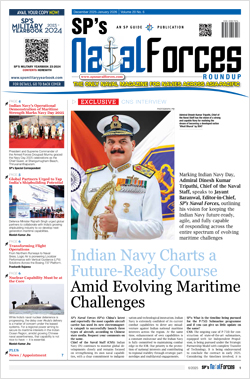INDIAN ARMED FORCES CHIEFS ON OUR RELENTLESS AND FOCUSED PUBLISHING EFFORTS

The insightful articles, inspiring narrations and analytical perspectives presented by the Editorial Team, establish an alluring connect with the reader. My compliments and best wishes to SP Guide Publications.

"Over the past 60 years, the growth of SP Guide Publications has mirrored the rising stature of Indian Navy. Its well-researched and informative magazines on Defence and Aerospace sector have served to shape an educated opinion of our military personnel, policy makers and the public alike. I wish SP's Publication team continued success, fair winds and following seas in all future endeavour!"

Since, its inception in 1964, SP Guide Publications has consistently demonstrated commitment to high-quality journalism in the aerospace and defence sectors, earning a well-deserved reputation as Asia's largest media house in this domain. I wish SP Guide Publications continued success in its pursuit of excellence.
- Global Partners Urged to Tap India's Shipbuilding Potential: Rajnath Singh at Samudra Utkarsh
- All about HAMMER Smart Precision Guided Weapon in India — “BEL-Safran Collaboration”
- India, Germany deepen defence ties as High Defence Committee charts ambitious plan
- G20 Summit: A Sign of Global Fracture
- True strategic autonomy will come only when our code is as indigenous as our hardware: Rajnath Singh
- India–Israel Joint Working Group Meeting on defence cooperation to boost technology sharing and co-development
Procurement
Scope of Offsets Enlarged
India gives OEMs (original equipment manufactures) more leeway
sertraline for anxiety and panic attacks
generalized anxiety disorderSeveral key demands of foreign OEMs have been incorporated into India’s Revised Defence Offsets Policy, which was put in place recently. The objective is to make offsets delivery more doable. Worries were being expressed by foreign suppliers over deliverability because offsets obligations for big deals like the MMRCA are to the tune of $10 billion ( 55,000 crore). The OEMs have to buy or export from India permitted items to discharge offsets obligations.
The list of items available for discharge of offsets have now been expanded. These include more types of ships under the category ‘Vessels of War’. Under the DPP 2011, Internal Security and Civil Aerospace were added to the list of offsetable items. The category of Internal Security has been further widened and clarified under the new heads of Inland and Coastal Security. Earlier, only 13 categories of defence items were permitted as offsets.
In another significant concession, Services will be treated as offsets. Repair will also be permissible. Earlier, only maintenance, and not repair, was allowed. This had implications for investments in maintenance, repair and overhaul (MRO) facilities. Research and Development will also be treated as an offsetable service, provided such facilities are set up at Government-recognised facilities.
A significant concession in the revised policy is the right of the OEM to change the Indian Offset Partner (IOP) as well as the offset item. Other highlights include the extension of offset banking to seven years.
Maximum time permissible to discharge offset obligations has been relaxed to two years beyond the duration of the main contract.
Also, there will be limited liability in case of default. A penalty of 5 per cent will be charged on unfulfilled obligations, with an overall cap of 20 per cent. Earlier, a five per cent compounding penalty was prescribed with no upper limit stated. OEMs stand to be barred for five years in case of non-fulfillment of obligations.
Multipliers will be offered as encouragement for introducing MSMEs as Indian Offset Partners. Transfer of technology both to the DRDO and private sector will also earn multipliers. Transfer of dual use technology will be entitled to additional multipliers.
Offset credits have been more clearly defined. The value of imported components will be discounted. In terms of investment for offsets, a clear distinction has been drawn between FDI and investment in kind.





